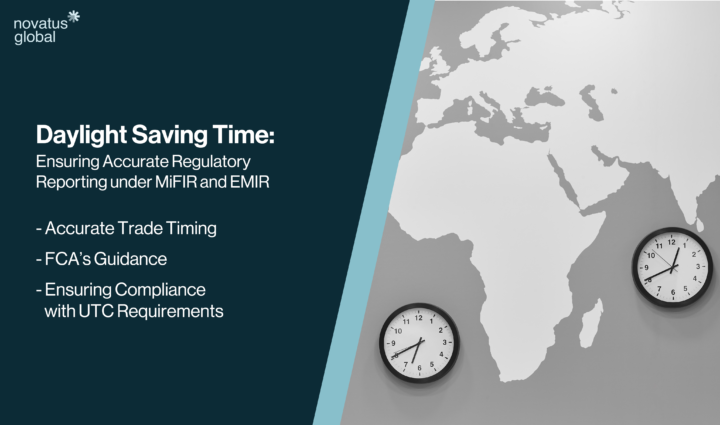
Daylight Saving Time: Ensuring Accurate Regulatory Reporting under MiFIR and EMIR
On the 31st of March, during the early hours of the morning, clocks across the UK and most of mainland Europe will advance by one hour as they transition to Daylight Saving Time (DST). Given that Europe spans several time zones, this change happens at varying local times depending on the region.
While adjusting your household clocks may be a minor inconvenience— leaving you with mismatched times on your microwave and oven—financial firms must be mindful of a far more critical obligation: ensuring that time fields in regulatory reports under MiFIR (Markets in Financial Instruments Regulation) and EMIR (European Market Infrastructure Regulation) are consistently recorded in Coordinated Universal Time (UTC).
In this article we explore daylight saving time’s affect on regulatory reporting and the guidance given by the FCA and the CSSF on the matter.

Regulatory Significance of Accurate Trade Timing
In regulatory reporting, precision in time recording is essential. Both trade and transaction reports submitted under MiFIR and EMIR require timestamps to be in UTC, regardless of local time changes due to daylight saving time. Time accuracy is a key focus for regulators, as it directly affects market transparency and the detection of potential market abuse.
Failure to report trades with the correct UTC timestamps can result in severe regulatory scrutiny. Historically, national competent authorities (NCAs) across the UK and EU have flagged such errors as a common compliance issue following DST transitions.
UK FCA’s Guidance on Daylight Saving Time and Time Accuracy
The UK’s Financial Conduct Authority (FCA) has long emphasised the importance of correct time reporting during DST transitions. In Market Watch 59, the FCA specifically highlighted this issue, stating:
“The time when the transaction was executed should be reported in Coordinated Universal Time (UTC). We continue to see errors in transaction reports when UK clocks transition to and from British Summer Time, as well as errors driven by inaccurate clock synchronisation. Firms should have arrangements in place to ensure consistent and accurate reporting of trading date and time.”
This clear directive underscores the expectation that firms must implement robust controls to ensure reporting remains accurate during time shifts.
CSSF’s Position on Accurate Time Reporting
The Commission de Surveillance du Secteur Financier (CSSF) in Luxembourg has also commented on the recurring issue of incorrect time reporting during DST. According to the CSSF:
“In the context of data quality tests performed on transaction reports, the CSSF identified that in several transaction reports the time indicated in field 28 ‘Trading date time’ was the local time instead of UTC. Investment firms have been informed that, within the framework of the transaction reporting obligation, dates and times shall always be reported in UTC.”
Such statements from leading NCAs demonstrate the critical importance of ensuring firms adhere to time reporting rules, especially during DST changes.
Ensuring Compliance with UTC Requirements
For firms operating under MiFIR and EMIR reporting obligations, there are several practical measures to ensure compliance during DST transitions:
1. Automated Systems with UTC Configuration:
Ensure that reporting systems automatically capture and convert local time to UTC, reducing the risk of human error.
2. Pre-Transition Testing:
Firms should perform checks ahead of the DST transition to verify that time-sensitive systems are correctly configured to report in UTC.
3. Ongoing Clock Synchronisation:
As highlighted by the FCA, inaccurate clock synchronisation remains a common source of errors. Ensuring that all internal systems, including order management and execution platforms, are synchronised to an accurate UTC reference is critical.
4. Employee Training and Awareness:
Compliance and operations teams must be well-informed about the importance of accurate time reporting and the risks associated with errors during DST transitions.
How Novatus Global Can Help
At Novatus Global, we understand the complexities that DST transitions introduce for firms with regulatory reporting obligations. Our expert teams offer a range of solutions to ensure seamless compliance, including:
-
- System Audits: We conduct detailed reviews of your reporting systems to ensure they are configured to handle DST transitions correctly.
- Regulatory Readiness Checks: Our pre-DST readiness assessments help identify potential issues in time reporting, ensuring firms are prepared ahead of the clock change.
- Ongoing Support and Monitoring: We provide real-time support and monitoring during critical periods to help clients quickly identify and resolve any discrepancies.
By partnering with Novatus Global, firms can confidently navigate DST transitions and maintain accurate, compliant reporting under MiFIR and EMIR.











